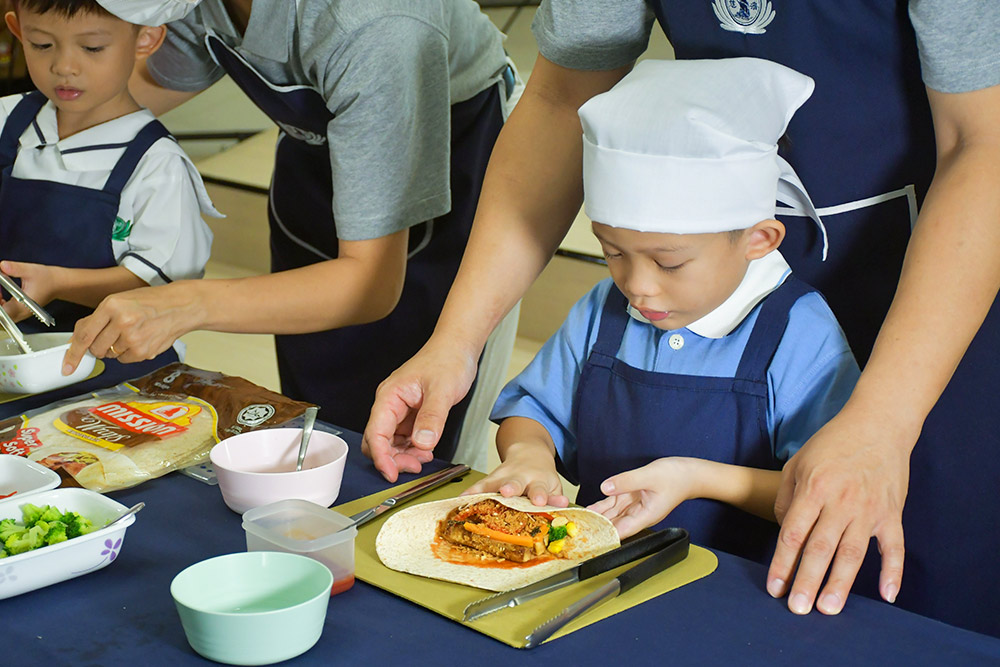 Participants learn about marine plastic pollution in a game at the eco-workshop. (Photo by Ng Hock Soon)
Participants learn about marine plastic pollution in a game at the eco-workshop. (Photo by Ng Hock Soon)
“The three-minute ocean rescue operation starts now!”
A group of principals and teachers with “fishing rods” in their hands began aiming at some plastic bottles in the middle of the “ocean”, trying their best to “fish” as many pieces of these non-biodegradable trash as they could. They were participating in a fun-filled eco-workshop held at Mee Toh School jointly organised by Tzu Chi Singapore and the school.
“Time’s up!” shouted the host.
It was a very challenging and difficult task to remove every single bottle; everyone looked helplessly at the remaining bottles that were floating in the “ocean” and gradually spreading out over a wider area.
The heavy downpour in the morning on the Saturday did not deter the 114 enthusiastic school principals and teachers from attending the eco-workshop. The participants were divided into groups to take part in various games and activities tailored for the purpose of instilling environmental protection.
“It is not an easy process, but we must be persistent. We should try to reduce, if not, avoid using PET bottles,” commented Cheryl Chua, the principal of My First Skool in Jurong West, after participating in the “fishing” game.
She further added, "This is a very interesting activity. We can consider conducting the game during the school’s sports day to promote environmental education to our parents and students.”
Cheryl also said that she planned to visit the Tzu Chi Eco-Awareness Centre in Woodlands in order to gain a deeper understanding of the concept of environmental protection and then integrate it into the preschool’s curriculum.
“We can educate the younger children to cherish food and to eat more nutritious fruits and vegetables, and teach the older children to use recyclables to make different handicraft items,” she added happily.
This group of principals and teachers, who were from various primary and secondary schools island-wide, truly let their hair down and enjoyed themselves in the games. Among them was Koh Guan Hong, a secondary school Design and Technology teacher, who specially made time to attend the workshop as he was very keen to learn more about Tzu Chi.
"I realised that the strength of one person is not enough. We need to work together to make things happen. And we must always improvise to improve efficiency," he said.
Koh scored a near perfect score in a game that tested participants on how to differentiate recyclables from non-recyclables. He hoped to discuss with his colleagues in the science department of his school how to design environmental activities to stimulate the interest of high school students on the topic.
 (Photo by Alice Toh)
(Photo by Alice Toh)
 Secondary school Design and Technology teacher Koh Guan Hong sorting trash into recyclables and non-recyclables (Photo by Alice Toh)
Secondary school Design and Technology teacher Koh Guan Hong sorting trash into recyclables and non-recyclables (Photo by Alice Toh)
Zero Food Waste
“What does this ‘9 million’ stand for?” asked Li Mei Jin, one of the speakers at the workshop.
Everyone had a shock when she revealed that the figure was actually the number of people who died of hunger in 2017, according to the United Nations World Food Programme.
Through creatively designed games, Li Mei Jin, Zheng Hua and Zhang Xiu Yu, who all hailed from Taiwan’s Tzu Chi Teachers’ Association, drove home the message that the food wasted each year could feed 18 million people globally, and explained how everyone could make good use of a “Food Bank” and deal with unfinished food.
 “What does this 9 million stand for?” asked Li Mei Jin (right), a veteran teacher from Taiwan.
“What does this 9 million stand for?” asked Li Mei Jin (right), a veteran teacher from Taiwan.
 A creatively designed board game that helps participants understand the importance of reducing food waste and how to reduce it. (Photo by Alice Toh)
A creatively designed board game that helps participants understand the importance of reducing food waste and how to reduce it. (Photo by Alice Toh)
Principal of Mee Toh School Tan San San has been campaigning for zero food waste in her school in recent years, urging students to finish all the food on their plates. In addition to that, the school has also launched a series of environmental education activities, and one of them is a waste recycling programme that involves parents in recycling work.
Tzu Chi’s senior recycling team leader, Susan Tan, shared, “According to the latest statistics by the Singapore Environment Council, Singapore shoppers use 820 million plastic bags from supermarkets each year, and this is a very shocking figure. Tzu Chi has 39 recycling points that encourage residents to reduce plastic waste by refusing disposable utensils. We hope that every teacher will teach their students about environmental protection in school.”
Ng Soo Lian, a teacher from Unity Primary School, said that environmental protection has become part of her daily life. She firmly believes that it has to start from herself or the parents, such as taking the initiative to care about the surroundings and setting a good example for children. She added that everybody can do a lot to protect the environment and that what is most important is to overcome the hurdles and take the plunge.
“As teachers, it is our role to educate students and to instil environmental awareness in our family and friends,” said Ng.
The event was brought to an end with a heartwarming sign language performance, “A Clean Earth”, presented by Tzu Shao (Tzu Chi Teenagers’ Class). May every participant on this day share what they have learned with their students and encourage more people to take practical actions to protect Mother Earth!
 (Photo by Alice Toh)
(Photo by Alice Toh)



